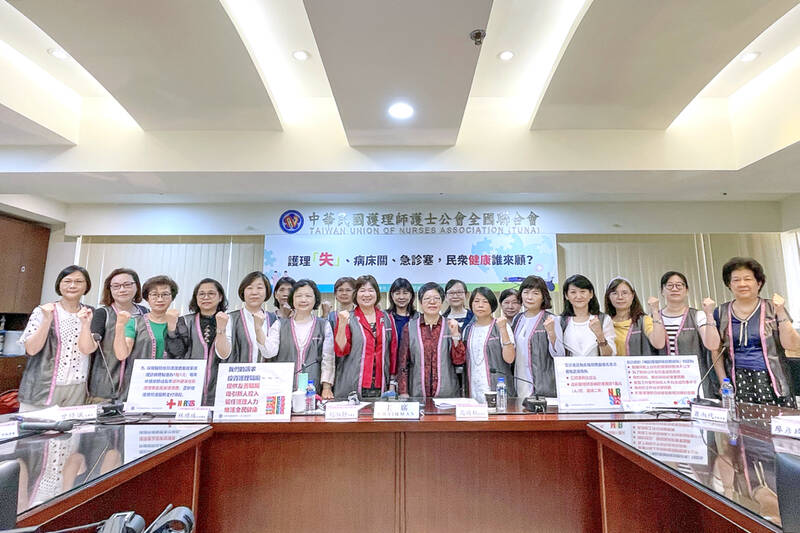Nearly 57 percent of nurses said they do not think a Cabinet plan to provide bonuses to night and overnight (graveyard) shift nurses would help to address the nation’s nursing shortage, according to a survey published on Thursday by the Taiwan Union of Nurses Association (TUNA).
The COVID-19 pandemic has worsened the national nursing shortage, as reflected in official figures.
Ministry of Health and Welfare (MOHW) data show that there are about 310,000 registered professional nurses in Taiwan, but as of Oct. 11, only 188,879 were working, accounting for about 60 percent, with about 118,000 nurses working in hospitals.

Photo: Chiu Chih-jou, Taipei Times
Last year, the turnover rate of nursing staff reached 11.79 percent, while the vacancy rate stood at 6.53 percent, both a 10-year high, TUNA president Chi Shu-ching (紀淑靜) said at a news conference on Thursday, citing the ministry’s data.
In a bid to boost nursing staff numbers, the Cabinet on Sept. 28 approved a 12-point incentive program, which includes paying a bonus to night-shift nurses, with the aim of improving working conditions.
However, the plan has drawn criticism from many nurses, with some expressing worries that offering an additional bonus only to night-shift nurses could cause an inequitable distribution of nursing personnel and lead to fewer day-shift nurses, the union said.
The survey found that 34 percent of respondents said they completely disagree that the policy would help boost the workforce, 22.9 percent disagree and 22.8 percent were unsure of what effect it would have, TUNA executive director Hsiao Shu-tai (蕭淑代) said.
Many respondents felt the night-shift incentive policy would “be considered unfair by day-shift nurses,” she said. “It makes shift booking, shift swapping and scheduling even more difficult” and could cause additional sources of conflict among coworkers and create management problems, she said.
A shortage of nurses has led hospitals in Taiwan to close wards and reduce bed numbers. As a result, emergency room visits continue to increase, creating a heavy burden on emergency room paramedics, Chi said.
Reducing overcrowding in emergency rooms is critical to addressing the nursing shortage and better patient outcomes, she added.
The top-priority measures the ministry should implement now are to first raise funds to cover a salary increase of NT$10,000 per nurse per month for two consecutive years, and to amend regulations on nurse-patient ratios in three shifts, Chi said.
The poll was conducted from Oct. 6 to Oct. 9 by sending a questionnaire to 118,000 hospital nurses asking them questions about the night-shift bonus policy, with 25,519 valid samples collected.
MOHW Department of Nursing and Healthcare Director-General Tsai Shu-feng (蔡淑鳳) said the policy of offering bonuses to night and graveyard-shift nurses is only a supplementary measure in the 12-point incentive program, and the government’s policy direction is coherent with the association’s suggestions.

An undersea cable to Penghu County has been severed, the Ministry of Digital Affairs said today, with a Chinese-funded ship suspected of being responsible. It comes just a month after a Chinese ship was suspected of severing an undersea cable north of Keelung Harbor. The National Communications and Cyber Security Center received a report at 3:03am today from Chunghwa Telecom that the No. 3 cable from Taiwan to Penghu was severed 14.7km off the coast of Tainan, the Ministry of Digital Affairs said. The Coast Guard Administration (CGA) upon receiving a report from Chunghwa Telecom began to monitor the Togolese-flagged Hong Tai (宏泰)

A cat named Mikan (蜜柑) has brought in revenue of more than NT$10 million (US$305,390) for the Kaohsiung MRT last year. Mikan, born on April 4, 2020, was a stray cat before being adopted by personnel of Kaohsiung MRT’s Ciaotou Sugar Refinery Station. Mikan was named after a Japanese term for mandarin orange due to his color and because he looks like an orange when curled up. He was named “station master” of Ciaotou Sugar Refinery Station in September 2020, and has since become famous. With Kaohsiung MRT’s branding, along with the release of a set of cultural and creative products, station master Mikan

RISING TOURISM: A survey showed that tourist visits increased by 35 percent last year, while newly created attractions contributed almost half of the growth Changhua County’s Lukang Old Street (鹿港老街) and its surrounding historical area clinched first place among Taiwan’s most successful tourist attractions last year, while no location in eastern Taiwan achieved a spot in the top 20 list, the Tourism Administration said. The listing was created by the Tourism Administration’s Forward-looking Tourism Policy Research office. Last year, the Lukang Old Street and its surrounding area had 17.3 million visitors, more than the 16 million visitors for the Wenhua Road Night Market (文化路夜市) in Chiayi City and 14.5 million visitors at Tainan’s Anping (安平) historical area, it said. The Taipei 101 skyscraper and its environs —

Taiwan on Friday said a New Zealand hamburger restaurant has apologized for a racist remark to a Taiwanese customer after reports that it had first apologized to China sparked outrage in Taiwan. An image posted on Threads by a Taiwanese who ate at Fergburger in Queenstown showed that their receipt dated Sunday last week included the words “Ching Chang,” a racial slur. The Chinese Consulate-General in Christchurch in a statement on Thursday said it had received and accepted an apology from the restaurant over the incident. The comment triggered an online furor among Taiwanese who saw it as an insult to the